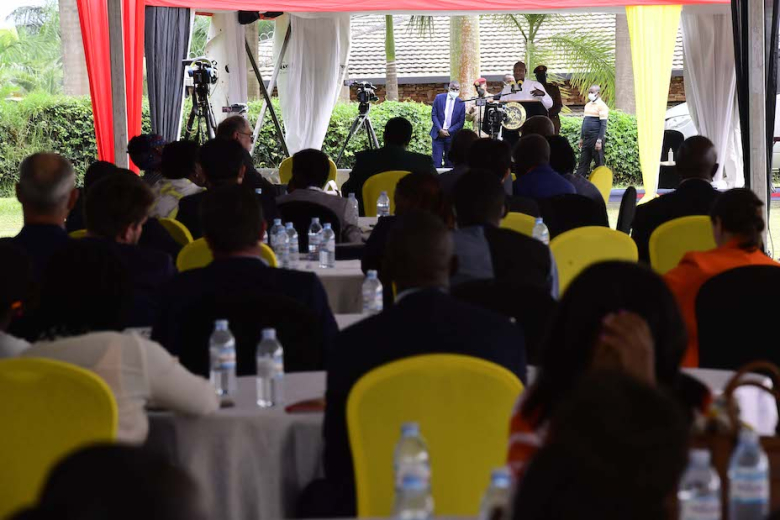
BY PPU REPORTER
President Yoweri Museveni has defended the nuclear power generation in Uganda, clarifying that the crisis of 2005 when a severe drought affected the hydro power generation at Owen falls dam in jinja prompted him to direct the ministry of energy and mineral development to diversify the energy mix to ensure energy security for the country.
“In 2005, Uganda experienced drought that affected hydro electricity generation from Owen Falls Dam. As a result, we resorted to expensive fossil powered plants to support the economy which prompted me to direct the Ministry of Energy and mineral Development to diversify the energy mix to develop all the available resources including nuclear energy as a means to address the electricity needs of the country,” the President said. President Museveni made the remarks this afternoon during the opening of the 2nd Africa Nuclear Business Platform Conference and Exhibition 2023 at Speke Resort Munyonyo.
President Museveni warmly welcomed all delegates to Uganda and congratulated the Ministry of Energy and Mineral Development as well as the Nuclear Business Platform for organizing and hosting the conference.
“I greet all of you and I welcome our international delegates to Uganda. Karibu Sana,” he said.
The President further noted that the sustainable development and the utilization of these resources necessitates establishing transparent and well-balanced partnership with key technology providers.
“Therefore, this meeting presents a very good opportunity for exploring areas of strategic collaborations between African countries pursuing nuclear energy development and nuclear energy providers in forging the way forward,” he observed.
While referring to the speech by the representative of the South Korean CEO of the Korean Hydro and Nuclear Company (KHNP), Mr. Cha Seop Kim who said Korea has made great strides in the nuclear development, Mr. Museveni pointed out that the people of Africa and Uganda in particular including the government officials lack the mentality to initiate development programs citing Korea that was in the 1960’s poorer than some of the African countries, today has 25 nuclear power plants.
He said in 1986 Uganda was generating only 60 MW of electricity and the country will soon generate 2,100 MW of electricity observing that it will not be enough for the country's needs. He added that Uganda needs about 100,000MW of electricity.
President Museveni also noted that the population destroys about 40 billion cubic meters of trees annually for heating and cooking. He said while trees grow easily it is not however the correct way to go.
On uranium, the President reiterated his firm stand that the natural mineral will never be exported as it is needed for the generation of nuclear power.
“I halted the exportation of uranium because we need electricity for socio-economic development. The issue of Nuclear Power in Africa is a must, it is reliable. The option of nuclear power is a very wise one; we should not waste time on that,” he stressed.
President Museveni further told delegates that the potential of rivers in Africa that include the Nile, Congo, Niger and Zambezi is about 300 MW and they are not reliable.
President Museveni also witnessed the signing of the three (3) Memoranda of Understanding between the Ministry of Energy and Mineral Development Officials and partners in the nuclear energy sector.
The first MOU was that of the establishment of a center of excellence at Soroti University and was signed by the Minister of State for Energy Hon Okasai Opolot while the Vice Chancellor Professor Ikojja signed on behalf of the University.
The Second MOU was for the establishment of the center for Nuclear Science and Technology at Soroti University and was signed by the Vice President of IVAP SE Mr. Pablo Abbate on behalf of IVAP SE group of Argentina and Hon. Okasai signed on behalf of the government of Uganda.
The 3rd MOU was for the development of a nuclear power plant in Uganda and was signed by Mr. Cha-seop Kim who was representing the CEO of South Korea's Hydro and Nuclear Power Company Dr. Joo-ho-Whanga.
Earlier, the Prime Minister the Rt. Hon. Robinah Nabbanja said nuclear power is one of the options that will enable Uganda to achieve global goals of accessing electricity for all. She added that potential sites for the construction of the plants have been identified one of them being in Buyende district. She thanked IAEA for the technical support in the feasibility studies.
The Minister of Energy and Mineral Development, Hon. Ruth Nankabirwa who was represented by the Minister of State for Energy. Hon. Okaasai Sidronius Opolot told the audience that nuclear power offers many advantages such as a reliable and stable energy supply to enable industrialisation and thus energy security.
She added that the conference comes at the right time when the Government of Uganda has made the plans to incorporate nuclear power in the country’s energy mix, with an installation, currently standing at 1346MW mainly from Hydro.
“Your Excellence, this was your clearly thought out plan after the 2007 drought the country experienced leaving us in a black out. Your Excellency, since 2008, formable steps have been taken to develop a nuclear power programme for the Country. The Atomic Energy Act, 2008 is now under review and my Ministry has prepared Principles and a draft Nuclear Energy bill which have been presented to the Cabinet Standing Committee on Nuclear Energy before being sent to Parliament for strengthening of the nuclear power programme,” Hon. Nankabirwa said in a statement as read by Hon. Sidronius.
The Minister also brought it to the President's attention that through his visionary leadership, 20 young Ugandan graduates were sent for further training in nuclear related fields abroad (United Kingdom, South Korea, Egypt, Ghana, Russia and China) and these have since come back and were able to develop a nuclear power road map strategy to kick start the nuclear power infrastructure development activities both for the regulatory side, the Atomic Energy Council, and also in the Ministry, the Nuclear Energy Department, to shape the envisaged 2000MW Nuclear power project.
“Your Excellence, as you are aware, a number of studies have been undertaken, choosing Buyende district as a future host of the Nuclear Power Programme. We are currently undertaking community engagements in the district for the Wananichi to appreciate the Government programme.”
The Deputy Director of IAEA Mr. Mikhail Chudakov pointed out that the clear alternative for clean energy is nuclear power that can lift many people in Africa from poverty.
Her said nuclear power can also mitigate the issue of climate change.
Running from 14th - 7th, March and hosted by the Ministry of Energy and Mineral Development, the Africa Nuclear Business Platform 2023 (AFNBP 2023) has attracted over 300 stakeholders from the domestic and international nuclear community who pursue nuclear energy implementation to understand and discuss nuclear energy developments in Africa and explore areas of strategic collaborations to move Uganda and African countries' nuclear industry forward.


